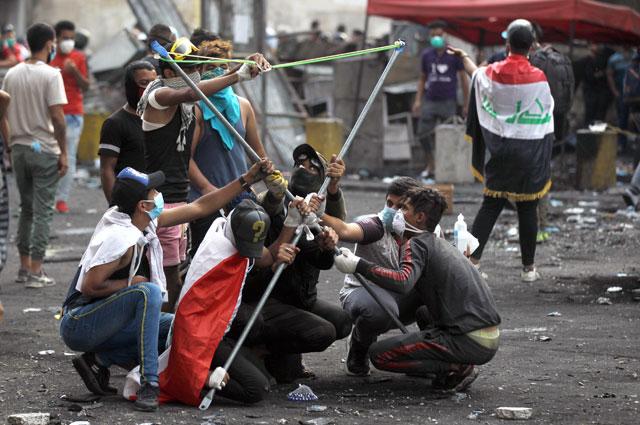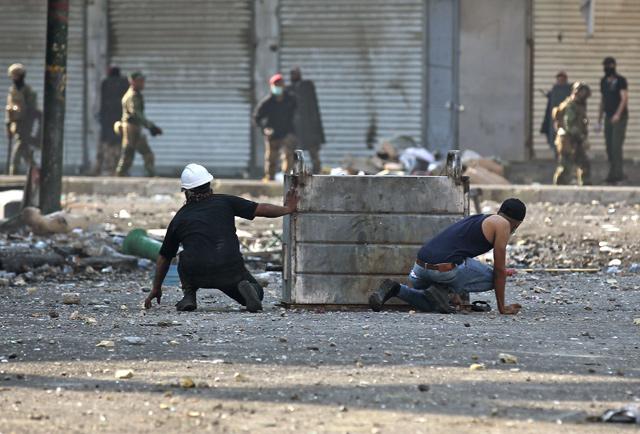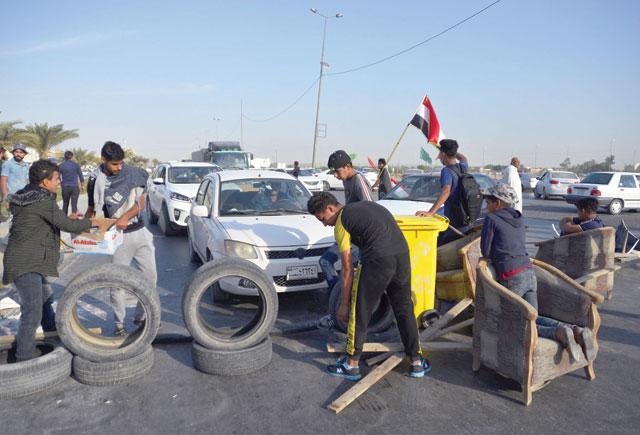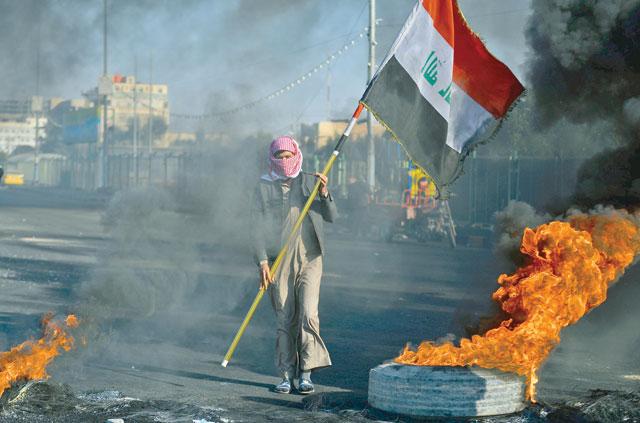You are here
Tear gas grenades kill Iraq protesters as gov't feels heat
By AFP - Nov 15,2019 - Last updated at Nov 15,2019

Young Iraqis use a giant slingshot as they gather in the capital Baghdad's Khallani Square during ongoing anti-government demonstrations on Thursday (AFP photo)
BAGHDAD — Four protesters were killed by tear gas canisters in Baghdad on Thursday as security forces tried to snuff out the largest grassroots movement to sweep Iraq in years.
Iraq's political elite has come under renewed pressure in recent days from both the street and the international community to seriously address calls for reform.
The UN, Washington and human rights groups have all criticised Baghdad authorities' harsh response to the protests, which has left more than 330 people dead since the start of October.
Early Thursday, four protesters were killed when they were hit by tear gas canisters near the capital's main protest camp in Tahrir (Liberation) Square, medical sources told AFP.
In heated skirmishes, groups of young men wearing surgical masks and construction helmets tossed back tear gas canisters at riot police stationed behind concrete blast walls.
The protesters have occupied the square for three weeks, braving live rounds, stun grenades and even machine gun fire.
Security forces have relied heavily on tear gas to confine them to Tahrir, and rights groups have accused them of improperly firing the canisters directly into crowds at close range, shattering protesters' skulls and chests.
One angry activist reminded security forces that the Shiite religious leadership, or marjaiyah, has condemned such excessive violence.
"Didn't the marjaiyah say forces shouldn't use live fire?" he yelled angrily. "Doesn't this count as live fire?"
Just beside him, a demonstrator was carried away after collapsing on the ground, overcome by the potent tear gas.
Thursday's deaths marked a resurgence of bloodshed after a few days of relatively peaceful protests in the capital.
The crowds in Tahrir have swelled again with students and striking teachers in recent days.
In the southern hotspots of Diwaniyah, Nasiriyah, Hilla and Kut, schools and most government offices were closed on Thursday.
In a town north of Nasiriyah, security forces imposed a fresh curfew starting from 4:00 pm (1300 GMT) until the next morning, said an AFP correspondent.
Reinforcements also arrived in the area to help contain rallies there, said a security source, after protesters torched local officials’ homes in recent days.
The Old City of Najaf — one of Shiite Islam’s holiest sites — joined in with a general strike on Thursday.
One merchant there said that “we’re ready to take a loss for a day, or a month, or even 20 months. We’ve been losing for 16 years.”
He was referring to the time since the US-led invasion toppled longtime leader Saddam Hussein, ushering in a sectarian power-sharing system which demonstrators say is corrupt and must be replaced.
Iraq is OPEC’s second-largest producer but still lacks reliable public services such as mains electricity and drinking water.
“We have one message,” said Ali, a demonstrator in Tahrir. “We don’t want this government.”
To address protesters’ demands, the United Nations mission in Iraq (UNAMI) has proposed a phased programme of reforms, starting with an end to violence and including electoral reform and anti-corruption measures.
UNAMI chief Jeanine Hennis-Plasschaert has secured the support of Shiite spiritual leader Grand Ayatollah Ali Sistani and discussed the reform roadmap with members of parliament on Wednesday.
MPs have received a draft electoral reform bill but have yet to discuss it, and are planning to interrogate two ministers as part of a planned cabinet reshuffle.
Authorities must “step up to the plate and make things happen,” Hennis-Plasschaert told AFP on Wednesday.
Piling on the pressure, the US this week “deplored the death toll” from protest-related violence and demanded authorities address demonstrators’ “legitimate grievances”.
Human Rights Watch said it had documented security forces shooting at medics, field clinics and ambulances with tear gas and live rounds during rallies.
“Medical workers should not have reason to fear for their lives as they engage in heroic work in already dangerous environments,” regional director Sarah Leah Whitson said.
Doctors and activists have described to AFP a campaign of kidnappings they say is aimed at scaring them into stopping their work.
Late Wednesday, activist and medic Saba Mahdawi returned home after being held by unknown assailants for nearly two weeks, her family said.
Related Articles
NAJAF, Iraq — The United Nations' top official in Iraq and the country's most senior cleric urged authorities on Monday to get "serious" abo
BAGHDAD — Iraqi security forces fired live ammunition at protesters in the capital Wednesday as tensions rose elsewhere in the country betwe
BAGHDAD — Three Iraqi protesters were killed in the capital as thousands of anti-government demonstrators sought to shut streets across the














